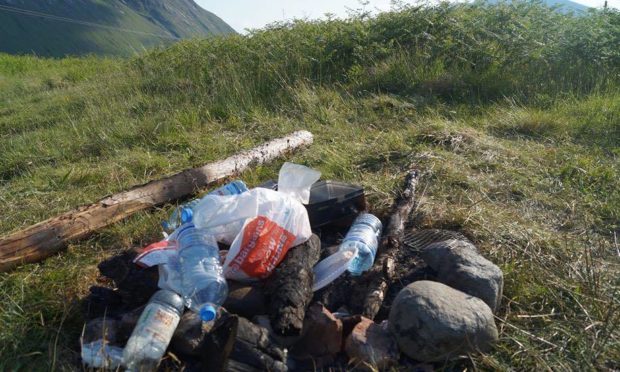Parking charges may be introduced at tourist hotspots in Lochaber to help improve visitor management after a series of issues this year.
Many parts of the area reported incidents of inappropriate behaviour as people flocked to the Highlands due to a staycation boom when lockdown restrictions eased.
Residents have raised widespread issues including litter and human waste pollution, irresponsible parking and damage to verges. Hotspots have included Glen Nevis, Glen Coe, Glen Etive, Morar and the Commando Memorial at Spean Bridge.
Highland Council’s Lochaber Committee yesterday discussed a visitor management report which said that in some cases local people placed boulders or logs on verges and lay-bys to prevent parking.
It said a lack of police resources in remote areas also led to difficulties tackling issues like speeding, dangerous driving and anti-social behaviour.
The report said problems highlighted include insufficient parking places in popular tourism spots, lack of capacity on rural roads for large vehicles such as campervans, too few and substandard passing places and overnight parking in non-designated areas.
Committee chairman Councillor Andrew Baxter said afterwards many members had been concerned about the issues for a number of years and want to take a lead in finding solutions: “We recognised that with everything that has happened this year, including the easing of travel restrictions after lockdown and people being encouraged to stay at home to holiday, many of the problems have become acute and have spread elsewhere.”
He said the committee discussed the possibility of introducing charges for parking in scenic places, similar to a scheme brought in by Argyll and Bute Council at Arrochar, providing access to The Cobbler, which was controversial among hillwalkers.
“There are plenty places around Lochaber where we could do that and visitors by and large would not be surprised to pay a couple of quid to park and we could reinvest the money into providing better facilities.
“Some of us have been pushing that in areas where the burden would fall on visitors rather than residents. We urged officers to move that forward faster than they have in the past.”
Mr Baxter said councillors will work with police to hopefully move resources during the summer to help communities tackle extreme anti social behaviour.
It was also suggested liaising with companies hiring campervans to provide more information to visitors on their behaviour, including how to drive on single-track roads and appropriate places to park.
Coach companies will also be contacted regarding causing road hazards by disgorging passengers at viewpoints, and landowners will be asked to identify land to be used for parking to alleviate pressure on roads.
“There are quite a lot of practical things we are going to be taking forward rather than the normal ask for more money”, Mr Baxter said.
Earlier this month a report from the Scottish Tourism Action Group called for action and funding to tackle problems caused by ‘overtourism’ and ‘dirty camping’.
It said “tens of millions” of pounds needs to be spent over 3-5 years initially on infrastructure, as well as an education campaign on access to rural areas. It also recommended a review of policing policy regarding inappropriate parking and for motorhome and campervan certification, a wild camping licensing scheme and increased use of countryside rangers. Among its possible solutions were stopover points where charges could be made depending on facilities.
